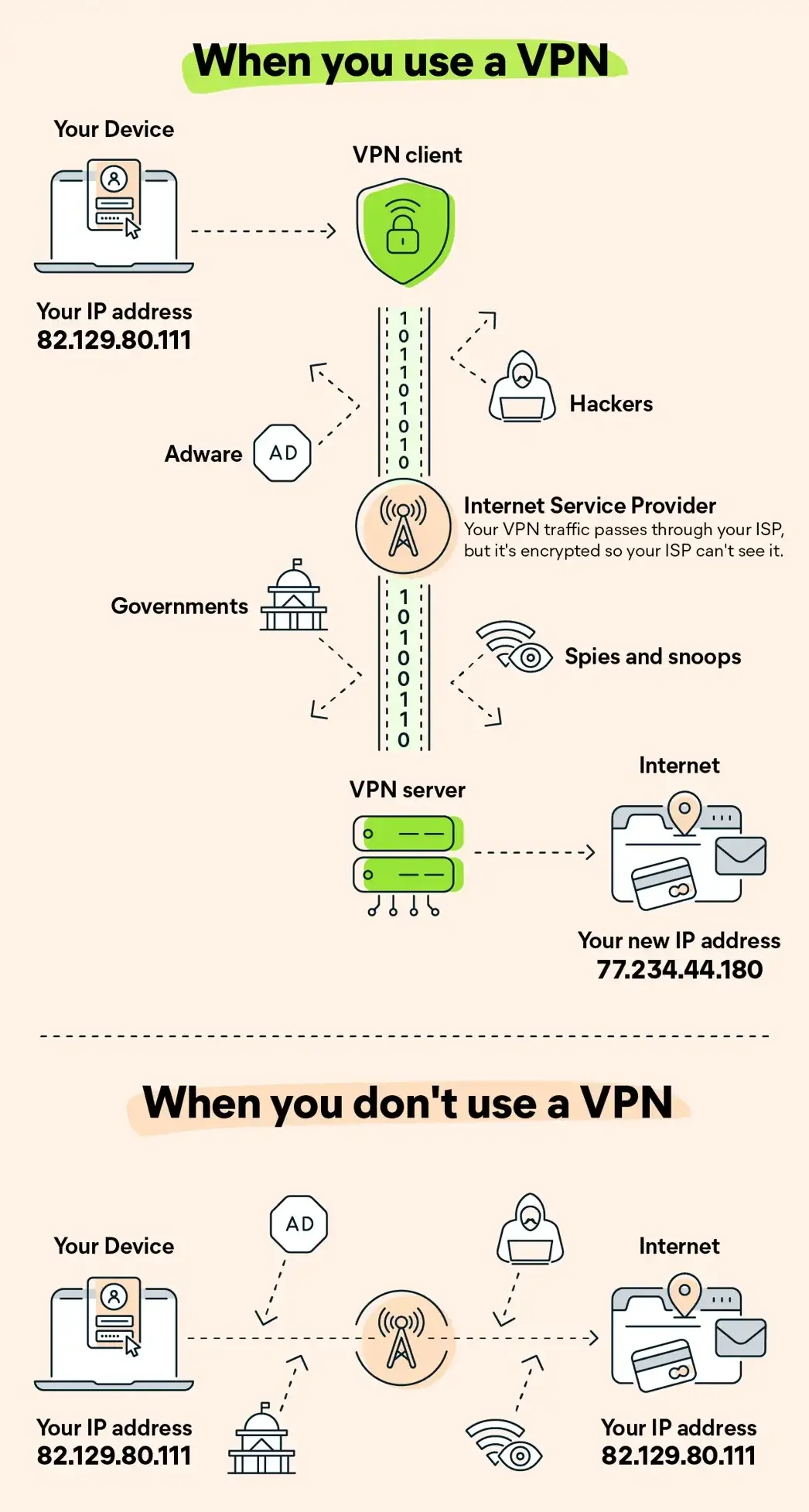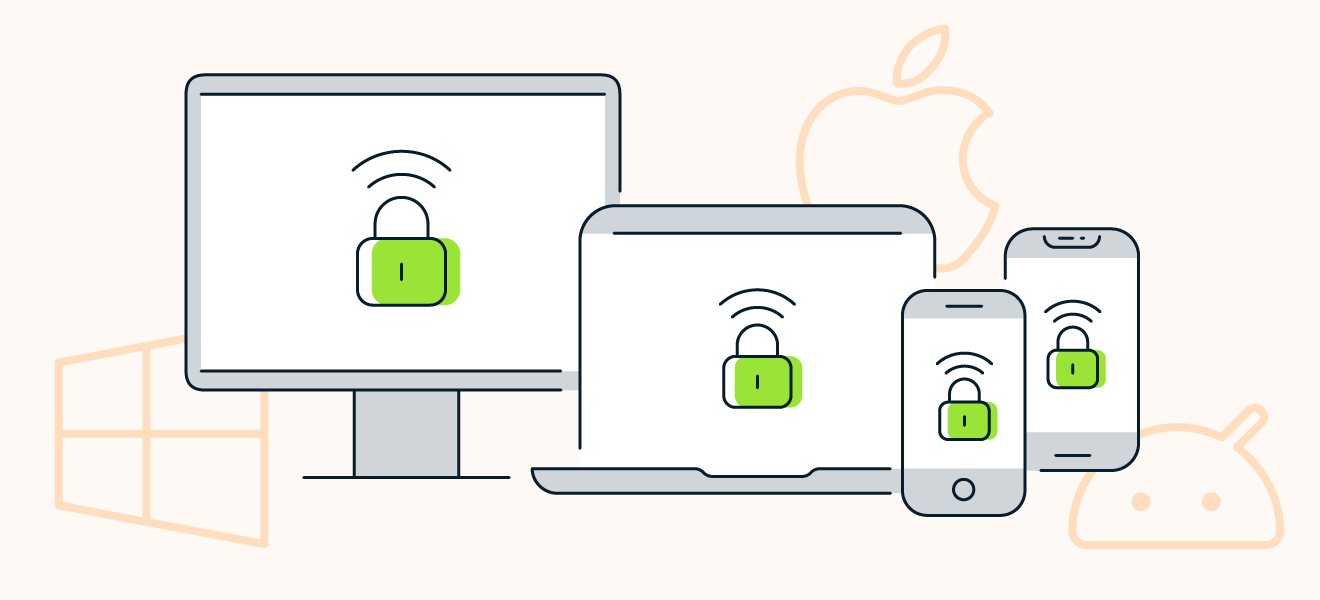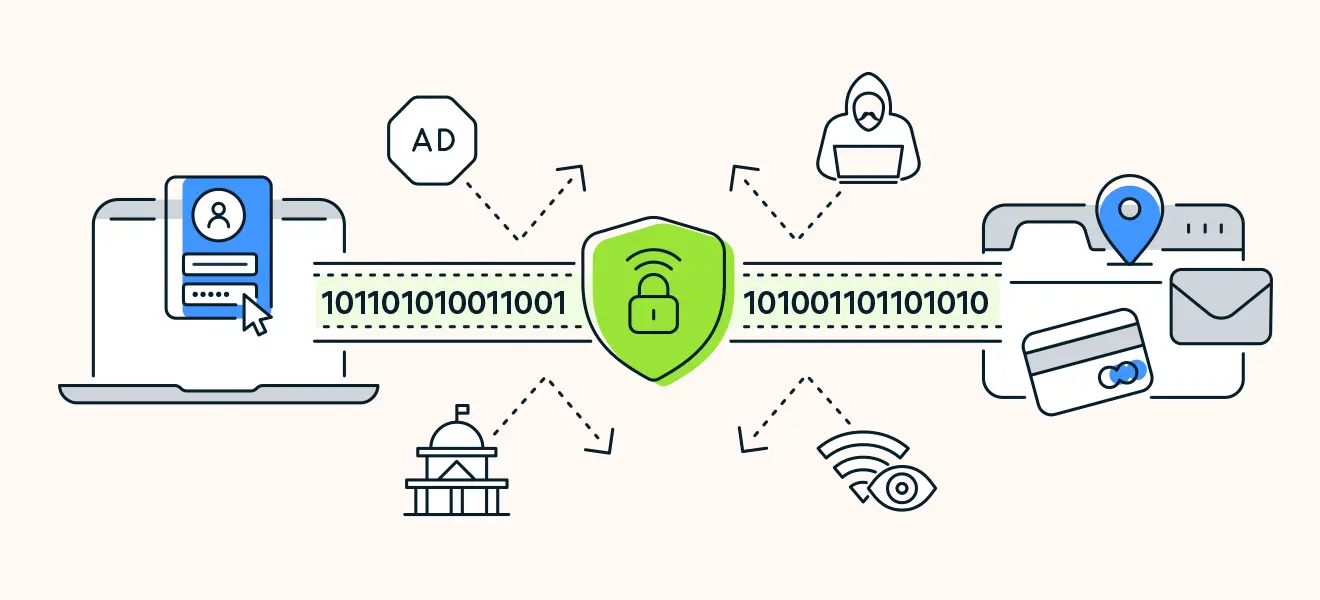A Virtual Private Network (VPN) is an essential tool in today’s digital age for anyone who cares about online security and privacy. It works by creating an encrypted “tunnel” between your device, be it a computer, phone, or tablet, and the internet.
This encryption ensures that all data you send and receive is protected from prying eyes, whether they be hackers, internet providers, or government agencies.
By using a VPN, you effectively hide your online activity and identity. Your real IP address is masked and replaced with the IP address of the VPN server, making you anonymous on the internet. This allows you not only to browse the web safely but also to bypass geographical restrictions and censorship, thus gaining access to content that might otherwise be unavailable to you.
Ultimately, a VPN gives you peace of mind and confidence that your online activities will remain private and protected.

How does a VPN work?
When you normally connect to the internet, your device communicates directly with web servers.
Your Internet Service Provider (ISP) and website operators can see your IP address, from which your approximate location can be derived, and track your online activity. Similarly, potential attackers can access this data if your communication is insufficiently secured.
A VPN acts as an intermediary that encrypts and redirects your internet traffic.

The process of how a VPN works
1. Establishing an encrypted connection
Your device first establishes an encrypted connection with the VPN server. This is done using special VPN protocols (e.g., OpenVPN, IKEv2/IPSec, WireGuard), which ensure that all communication between your device and the VPN server will be encrypted.
2. Data encryption
All data that your device sends and receives is encrypted using strong encryption algorithms (e.g., AES-256). This means that even if someone managed to intercept your communication, they would not be able to read it without the decryption key.
3. Encapsulating data in a tunnel
The encrypted data is then “wrapped” in special packets and sent through the created encrypted tunnel to the VPN server.
4. Changing the IP address
The VPN server replaces your real IP address with its own IP address. The web servers you communicate with only see the IP address of the VPN server, not yours. This hides your identity and location.
5. Redirecting traffic
The VPN server forwards your requests to the target web servers and receives responses from them.
6. Decrypting data
After receiving the response from the web server, the VPN server decrypts the data and sends it back to your device through the encrypted tunnel.
7. Displaying content
Your device decrypts the data and displays the requested content.
Essentially, a VPN creates a secure and private “tunnel” for your internet communication.
This tunnel protects your data from being tracked and hides your identity and location from web servers and potential attackers. This allows you to browse the internet more safely and anonymously.

Why use a VPN?
Using a VPN brings a number of advantages that you will appreciate in various situations. Let’s look at them in more detail:
1. Increased privacy
Hiding IP address and online activity: Your Internet Service Provider (ISP) has an overview of all the websites you visit and the services you use online. This information can be stored and theoretically shared with third parties. A VPN hides your real IP address and replaces it with the IP address of the VPN server.
Therefore, your ISP only sees that you are connected to the VPN server but does not see which websites you visit and what you do on the internet. Your online activity remains hidden from website operators and anyone else who might be trying to track you.
Protection on public Wi-Fi: Public Wi-Fi networks in cafes, airports, hotels, and other places are often inadequately secured. This opens the door for hackers who can break into your device and steal your sensitive data.
A VPN creates an encrypted tunnel for your communication, making it impossible to eavesdrop on your data even on unsecured Wi-Fi networks.
2. Increased security
Data encryption: A VPN uses strong encryption algorithms that transform your data into an unreadable code. This means that even if someone managed to intercept your communication, they would not be able to read the data without the decryption key.
Protection against cyber threats: Thanks to encryption and IP address hiding, a VPN protects you from hackers, phishing attacks, and other online threats. This is especially important when performing sensitive operations, such as online banking, shopping on the internet, or sending confidential information.
3. Access to blocked content
Bypassing geographical restrictions (so-called geoblocking): Many online services, such as streaming platforms (Netflix, Hulu, Disney+, Apple TV, BBC iPlayer, etc.), restrict access to their content based on the user’s geographical location. With a VPN, you can connect to a server in a country where the content is available, thus bypassing this restriction.
For example, you can connect to a server in the EU and watch European Netflix.
Overcoming censorship: In some countries, governments block access to certain websites and online services. A VPN allows you to bypass this blocking and gain access to the uncensored internet.
4. Protection from targeted advertising
Making it difficult to track online activity: Advertisers and advertising networks use various techniques to track your behavior on the internet so they can show you targeted ads. They track your IP address, visited websites, search terms, and other online activities.
Anonymizing your online profile: A VPN hides your IP address and encrypts your communication, making it difficult, if not impossible, for advertisers to track your online behavior and create a detailed profile for targeted advertising purposes. You will receive fewer relevant, but also less invasive, ads.

A VPN is a powerful tool for protecting your privacy, increasing security, and accessing information that may be geographically or politically restricted.
Regardless of whether you use the internet for work, entertainment, or travel, a VPN will provide you with the security and anonymity that is essential today.
